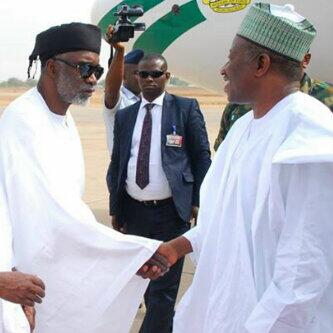During a meeting between twelve Northern Governors, and key officials of President Obama’s cabinet, several governors belonging to the platform of the All Progressives Congress told U.S officials that the Jonathan administration was suspected by them to be aiding the insurgents causing terror in the North.
The startling accusation is said to have caused Prof Ade Adefuye, the Nigerian ambassador to the United States to come to the defense of the GEJ administration but not before the damage had already been done.
Guardian reports:
WITH top U.S. government officials, including President Barack Obama’s National Security Adviser, Ms. Susan Rice, who was presiding, the issue of Boko Haram, 2015 elections and corruption among the Nigerian political elite became a hot debate at the White House earlier last week.
A meeting of 12 Northern State governors (and a deputy governor) and the US government on Tuesday in Washington DC took a dramatic turn when some of the governors, especially Governor Murtala Nyako of Adamawa State, initiated a frontal attack on President Goodluck Jonathan, forcing the Nigeria’s Ambassador to the U.S., Ade Adefuye, who was also in attendance, to join the fray, objecting to some of the comments against the President and the Federal Government.
Although Nyako was said to be the most vocal, he was not alone in raising critical views about the president and his policies, as the Borno and Kano State Governors also knocked hard on the Jonathan presidency.
The meeting was organised by the US government, through the US Institute of Peace, with a view to exploring how the Americans can work together with state governments in the North to address the Boko Haram insurgency and the underlying problem of socio-economic under-development in the region.
Present at the meeting in the Washington DC were governors Nyako (Adamawa), Isa Yuguda (Bauchi), Kashim Shetima (Borno), Ibrahim Dankwambo (Gombe), Rabiu Kwankwaso (Kano), Ibrahim Shema (Katsina) and Abdulfattah Ahmed (Kwara).
Others are Babangida Aliyu (Niger), Aliyu Wammako (Sokoto), Abdulaziz Yari (Zamfara), Idris Wada (Kogi), Usman Dakingari (Kebbi) and Prof. Ade Adefuye.
In attendance on the US side (in addition to Rice) were: Ambassador Johnnie Carson, Adviser (United States Institute of Peace), Mr. Grant Harris, Special Adviser to President Obama on Africa, Mr. John Mohr – Senior Staff Member – National Security Council and Assistant Secretary of State for Africa, Ms Linda Thomas-Greenfield.
Authoritative sources disclosed to The Guardian that Nyako, a former PDP governor, who switched camp to the APC, raised very sensitive issues, including allegations that the Federal Government failed to block importation of weapons into the country; weapons, which are being used to fuel the Boko Haram insurgency.
Nyako also alleged that federal security agencies were colluding with backers of Boko Haram to perpetuate the conflict in the North. He said such security agencies were the ones facilitating the clearance of arms and ammunitions through the border and transporting same to the terrorists.
The Adamawa State governor, who was said to have caused a grim silence by his allegations at the White House meeting, also claimed that the Jonathan presidency refused to identify Boko Haram sponsors despite arrest of some of the members. He cited particular instances where the military JTF were withdrawn in some of the locations in the three states where the terrorists’ activities have been intense, just in time for the terrorists to attack those locations. According to Governor Nyako, he was convinced that information was being passed from the security agencies to help the terrorists.
But Nyako’s main allegation was the motive behind the alleged collusion, which he said is a way to reduce the voting power of the North East in 2015 and subsequent polls, and keep the region perpetually underdeveloped.
It took the spirited response of the Nigerian Ambassador to the USA, Adefuye, and some of the other governors to halt Nyako’s allegations. Sources said Adefuye challenged Nyako to provide evidence for his allegations, and tongue-lashed him for playing politics of 2015 at the meeting.
Adefuye “did not take kindly to the allegations,” and the fact that the meeting was used by Nyako in particular to attack President Jonathan and the Federal Government, sources disclosed.
The source said the Ambassador “had to call Nyako to order,” and even sought the intervention of the organisers and other participants to ensure that the meeting did not turn into a forum to “wash Nigeria’s linen in public.” Sources said hot heads cooled after the Ambassador’s intervention.
Besides the Ambassador, the Governor of Kogi also opposed Nyako, especially explaining that the examples the Adamawa governor gave regarding how JTF people retreated from a location just before Boko Haram attacked were just coincidental.
Other Governors, who were critical over the Boko Haram issue, included the Borno Governor, Shettima, who also criticised the President and the Federal Government’s handling of the Boko Haram insurgency. However, Shettima also hoped that the insurgency would soon abate, urging for accelerated developmental projects in the affected states.
All the while, the US officials, including Rice, the NSA, kept listening, according to sources. Only few weeks ago, the US Assistant Secretary of State for Africa, Ms Linda Thomas-Greenfield, publicly challenged the Nigerian government to expose the backers of Boko Haram.
Governors of Kano and Gombe, however, also had a “fight” over the issue of corruption in Nigeria at the White House meeting when the Gombe Governor said the issue of corruption among Nigeria’s political elite is thriving because if a politician is accused of corruption all he has to do is to join the opposition party. Taking this as a direct personal attack, the Kano State Governor responded in annoyance that he did not leave PDP for APC because of corruption charges.


